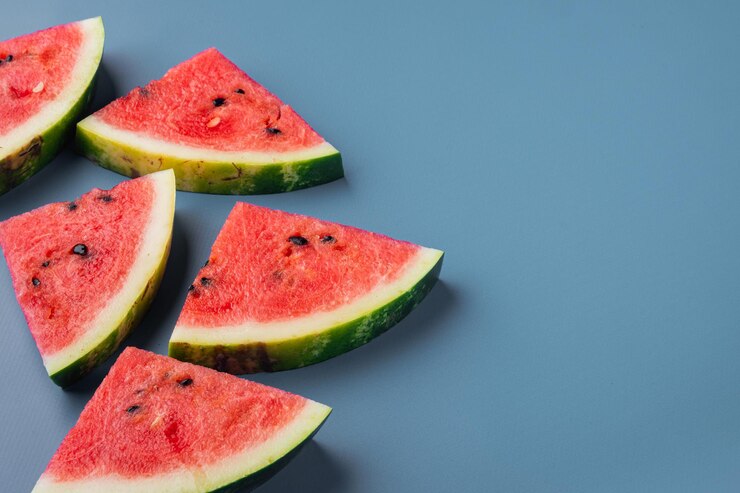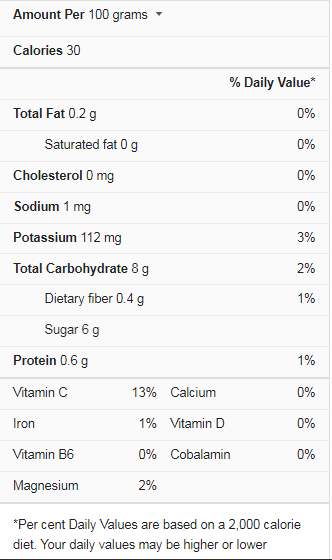Watermelon is a low-calorie summer food that is sweet and refreshing. It contains vital elements such as vitamins, minerals, antioxidants, and hydration. Watermelons belong to the cucurbitaceous family, including cantaloupe, honeydew, and cucumber. Watermelon is grown in various temperatures worldwide, from tropical to temperate, for its enormous edible fruit. It is a berry with a hard skin and no internal divisions and is botanically known as a pepo. To know watermelon nutrition facts, read further.
Many chronic diseases are fueled by inflammation. Watermelon’s antioxidants, lycopene, and vitamin C may aid in reducing inflammation and oxidative damage. In one study, rats given watermelon powder to supplement an unhealthy diet generated less oxidative stress and lower inflammatory marker C-reactive protein levels than control rats. In addition, 31 adults with obesity and elevated inflammatory markers were given vitamin C twice daily for eight weeks in research. Compared to the control group, they demonstrated a significant reduction in inflammatory markers.
Watermelon Nutrition Facts
Carbs
Watermelon’s carbs are primarily sugars, with only a tiny fiber. Fructose makes up half of the sugar, glucose makes up a quarter, and sucrose makes up less than a quarter, with other sugars making up tiny fractions. It’s crucial to measure Watermelon carefully if you’re calculating carbohydrates.
The glycemic index (GI) of Watermelon is 76.2, and this indicates it may cause your blood sugar to rise faster than foods with a lower GI. However, a half cup of sliced Watermelon has a glycemic load, which is considered modest when considering how much you consume each serving.
Fats
Watermelon has minimal fat, similar to other melons like cantaloupe and honeydew. Polyunsaturated fatty acids account for most of the fat, with monounsaturated and saturated fatty acids accounting for the remainder.
Watermelon can be considered a fat-free food for dietary purposes. Omega-3 fatty acids are found in the seeds (which are edible).
Protein
Watermelon has a low protein content, with only about 0.6 grams per 100 grams. Some companies, interestingly, make watermelon seed protein by sprouting and shelling the seeds.
On the other hand, fresh seeds will not provide that protein level because the seed’s shell inhibits the protein inside from being digested.
Minerals And vitamins
The nutrients in a fully ripe red watermelon are higher than in a less ripe watermelon. Watermelon is a vital source of vitamin C and vitamin A, with a single serving providing a considerable portion of your daily requirement for each.
Vitamin C promotes wound healing and may have anti-aging and immune-boosting properties6, while vitamin A is crucial for eye health.
Calories
Watermelon, sliced or balled, has about 30 calories per 1`00 grams. If you like to eat it wedged, a wedge around one-sixteenth of the melon contains nearly double or about 86 calories.
Health Advantages of Watermelon
In addition to being a delicious summer treat, Watermelon has some health benefits.
- Defends Against Dehydration
As its name implies, Watermelon contains almost 92 percent water, making it a particularly hydrating food. Try a couple of servings of Watermelon if you or your children have trouble drinking enough water, especially on hot summer days. Along with your hydration, you’ll gain more micronutrients.
- Reduced Blood Pressure
Watermelon has antioxidant properties because it is abundant in lycopene, a carotenoid phytonutrient demonstrated in studies to help lower or prevent high blood pressure. Tomatoes are well-known for their high levels of lycopene, but a fully ripe watermelon has even more.
- Reduced Infection And Cancer Risk
Flavonoids, carotenoids, and triterpenoids are some of the other antioxidants found in Watermelon. Antioxidants like antioxidants aid in cell repair and may reduce your risk of Infection and cancer in some cases.
- Assists In The Loss Of Weight
Watermelon was more filling than low-fat cookies in a small trial of overweight persons. They also saw improvements in body weight, BMI, waist-to-hip ratio, and blood pressure.
- Reduction Of Muscle Fatigue
Watermelon contains a high level of the amino acid citrulline. Concentrated citrulline capsules are sold as a nutritional supplement for athletic performance. Although some research demonstrates that citrulline supplements may lessen weariness after exercise, the effects of citrulline are not conclusive.
Tips for Serving Watermelon Include:
Juice: Blend sliced Watermelon with a few ice cubes to make a chilled, refreshing electrolyte drink ideal for rehydrating after a day in the heat.
Salad: To make a tasty and healthy salad, combine Watermelon, mint, and fresh mozzarella on a bed of spinach leaves. Drizzle with balsamic vinaigrette.
Smoothies: Make a watermelon smoothie or add orange juice for a tangier flavor. They are juicing that breaks down the fiber, making it more straightforward to absorb the sugar. Instead of drinking juice, people with diabetes should eat fresh Watermelon.
Roasted Seeds: To prepare a pleasant snack, roast the watermelon seeds for 15–20 minutes. One ounce (28.5 g) of seeds contains around 8 g of protein or 14–17 percent of a person’s daily protein requirements.
Is it Safe to Eat Watermelon Daily?
Watermelons should have no significant adverse effects if consumed in moderation. However, suppose you consume a large amount of fruit daily. In that case, you may have issues due to an excess of lycopene or potassium Watermelon is 92 percent water, making it an excellent choice for everyday hydration. Furthermore, because of its high water content, this melon has a low-calorie density or a low number of calories per unit of weight. Watermelon, for example, has a low-calorie density, which may help with weight loss by keeping you feeling full for longer consuming more than 30 mg of lycopene per day might cause nausea, diarrhea, indigestion, and bloating.
Is Watermelon A High-Sugar Fruit?
Watermelons are one of the most well-known summer fruits. They may appear sweet, but they’re low in sugar. One hundred grams of Watermelon contains less than 6 grams of sugar. Watermelon has the added benefit of being a good source of iron Watermelon is safe to eat in moderation by individuals with diabetes. Watermelon and other high-GI fruits, on the other hand, should be eaten with foods that are high in healthy fats, fiber, and protein.
Is Watermelon Good for Your Stomach?
Watermelon is high in water and also contains some fiber. These nutrients aid in maintaining a healthy gut by reducing constipation and supporting bowel regularity, which may aid digestion. Watermelon is high in water and has a tiny fiber, essential for a healthy digestive system. Water helps move waste through your digestive tract more efficiently, while fiber helps keep your bowels regular Watermelon can also cause significant bloating. That’s because it’s high in fructose, a natural sugar that wreaks havoc on our digestive systems. After all, it’s challenging to absorb completely, resulting in flatulence and, in some cases, an upset stomach.
Can Watermelon Make You Gain Weight?
Watermelon is a low-calorie fruit with 30 calories per 100 grams. According to the Mayo Clinic, a pound of body fat requires 3,500 calories. Hence Watermelon is unlikely to cause weight gain. Watermelon is also suitable for a low-fat diet because it contains less than a gram of fat per cup. We all enjoy eating Watermelon, but did you realize that it can aid in weight loss? Watermelon has a lot of water, roughly 94 percent. It’s also a harmful calorie fruit, which burns more calories during digestion than it takes in. Simply superficial, you burn more calories than you consume. However, if you consume a large amount of fruit daily, you may develop issues due to an excess of lycopene or potassium, according to the American Cancer Society.
Is Watermelon Good for Diabetes?
Watermelon is safe to eat in moderation by individuals with diabetes. Watermelon and other high-GI fruits, on the other hand, should be eaten with foods that are high in healthy fats, fiber, and protein. So, how much Watermelon is healthy for people with diabetes? “Watermelon’s glycemic load is minimal because it is 70% to 80% water”. Watermelon can be consumed in 150-200 gm portions by people with diabetes. Bananas are healthy and nutritious fruit to eat in moderation as part of a balanced, personalized diet plan for people with diabetes. Fresh, plant-based foods, such as fruits and vegetables, should be included in a diabetic’s diet. Bananas are a good source of nourishment without adding a lot of calories.
Is Watermelon Good for Blood Pressure?
Citrulline, an amino acid found in Watermelon, may aid in the management of high blood pressure. Citrulline aids in the production of nitric oxide, a gas that relaxes blood vessels and promotes artery flexibility. These effects help improve blood flow, which can help control high blood pressure. Citrus fruits, such as grapefruit, oranges, and lemons, have reduced blood pressure. They’re packed in vitamins, minerals, and plant chemicals that may help keep your heart healthy by lowering risk factors for heart disease like high blood pressure. Beet juice is the most excellent option, as it lowers blood pressure in just three hours. Other helpful liquids, such as tomato juice and pomegranate juice, may not immediately affect blood pressure, but they will over time.
Watermelon contains lycopene, a molecule that may be healthy for your eyes. Age-related macular degeneration is a common eye disorder that can lead to blindness in the elderly (AMD). The antioxidant and anti-inflammatory effects of lycopene may help prevent and inhibit AMD, while research is limited. The ability of inflammatory markers to injure cells was lowered when eye cells were treated with lycopene in a test tube Lycopene may help prevent the beginning and progression of Alzheimer’s disease by acting as an antioxidant. More research, however, is required.
Conclusion
Watermelon contains citrulline, an amino acid that can circulate blood through your body and reduce blood pressure. Watermelon’s high lycopene content benefits your heart, and it has been shown in studies to reduce the risk of heart attacks. Watermelon also includes citrulline, an amino acid that may help your body produce more nitric oxide. Nitric oxide causes your blood vessels to dilate, lowering your blood pressure. Magnesium, potassium, and vitamins A, B6, and C are among the heart-healthy vitamins and minerals found in Watermelon.
Watermelon contains several nutrients that may help to keep your heart healthy. The leading cause of death in the world is heart disease. By lowering your blood pressure and cholesterol levels, lifestyle factors like nutrition can help reduce your risk of heart attack and stroke. Lycopene has been shown in studies to help decrease cholesterol and blood pressure, and it may also aid in preventing oxidative damage brought on by excessive cholesterol levels.


